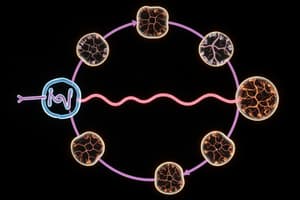Podcast
Questions and Answers
What are the potential causes of low sodium (Na) levels?
What are the potential causes of low sodium (Na) levels?
- Decreased excretion due to renal failure or hypoadrenocorticism
- Shift of water from intracellular fluid (ICF) to extracellular fluid (ECF)
- Excess loss through diarrhea, renal disease, or sweating (correct)
- Increased intake from overhydration or excessive sodium retention
What can lead to high potassium (K) levels?
What can lead to high potassium (K) levels?
- Shift of potassium from extracellular fluid (ECF) to intracellular fluid (ICF)
- Increased intake from overhydration or excessive potassium retention
- Decreased excretion due to renal failure or hypoadrenocorticism (correct)
- Alkalemia (Electroneutral Balancing), muscle/tissue damage, or IV hemolysis
What can cause low chloride (Cl) levels?
What can cause low chloride (Cl) levels?
- Shift of water from intracellular fluid (ICF) to extracellular fluid (ECF)
- Increased body water in edematous states like CHF or cirrhosis
- Decreased intake due to anorexia or poor diet
- Excess loss of HCL rich fluid from vomiting or sequestration (correct)
What is a potential cause of high chloride (Cl) levels?
What is a potential cause of high chloride (Cl) levels?
What can lead to high sodium (Na) and high chloride (Cl) levels?
What can lead to high sodium (Na) and high chloride (Cl) levels?
What can lead to low sodium (Na) levels?
What can lead to low sodium (Na) levels?
What is a potential cause of high chloride (Cl) levels?
What is a potential cause of high chloride (Cl) levels?
What can cause high potassium (K) levels?
What can cause high potassium (K) levels?
What can lead to low chloride (Cl) levels?
What can lead to low chloride (Cl) levels?
What can cause high sodium (Na) and high chloride (Cl) levels?
What can cause high sodium (Na) and high chloride (Cl) levels?
Flashcards are hidden until you start studying




